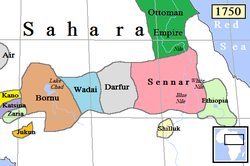Sultanate of Darfur
| Sultanate of Darfur | ||||||||||
| Arabic: سلطنة دارفور | ||||||||||
|
||||||||||
|
||||||||||
|
Sultanate of Darfur and surrounding states in 1750.
|
||||||||||
| Capital | Al Fasher after 1790 | |||||||||
| Languages | Fur, Arabic | |||||||||
| Religion | Sunni Islam | |||||||||
| Government | Absolute monarchy | |||||||||
| Sultan | ||||||||||
| • | 1603–1637 | Suleiman Solon | ||||||||
| • | 1873–1874 | Ibrahim | ||||||||
| Historical era | Early Modern Period | |||||||||
| • | Established | 1603 | ||||||||
| • | Disestablished | 6 November 1916 | ||||||||
|
||||||||||
| Today part of |
|
|||||||||
The Sultanate of Darfur was a pre-colonial Nile Valley state in present-day Sudan. It functioned independently from 1603 to October 24, 1874.
Darfur is composed mostly of semi-arid plains that cannot support a dense population. The one exception is the area in and around the Jebal Marra mountains. It was from bases in these mountains that a series of groups expanded to control the region. The Daju and the 14th century migrants the Tunjur were the earliest powers in Darfur according to written records. The transition of power from the Daju to the Tunjur was facilitated through marriage.
Eventually the Tunjur began marrying amongst the Fur people producing Sultan Dali, a celebrated figure in Darfur histories, who was on his mother's side a Fur, and thus brought the dynasty closer to the people it ruled. Dali divided the country into provinces, and established a penal code, which, under the title of Kitab Dali or Dali's Book, is still preserved, and differs in some respects from Quranic law. His grandson Suleiman (or "Sulayman", usually distinguished by the Fur epithet Solon, meaning "the Arab" or "the Red") reigned from 1603 to 1637, and was a great warrior and a devoted Muslim. Suleiman Solon is considered as the founder of the Keira dynasty and the sultanate of Darfur. During the 17th century, the Keira sultans introduced the feudal hakura system into Darfur.
The Tunjur introduced Islam to Darfur via their experience in the Muslim empires of Kanem and Ouaddai. Soleiman's grandson, Ahmed Bukr (c.1682-c.1722), made Islam the religion of the state, and increased the prosperity of the country by encouraging immigration from Bornu and Bagirmi. His rule extended east of the Nile as far as the banks of the Atbara.
...
Wikipedia



